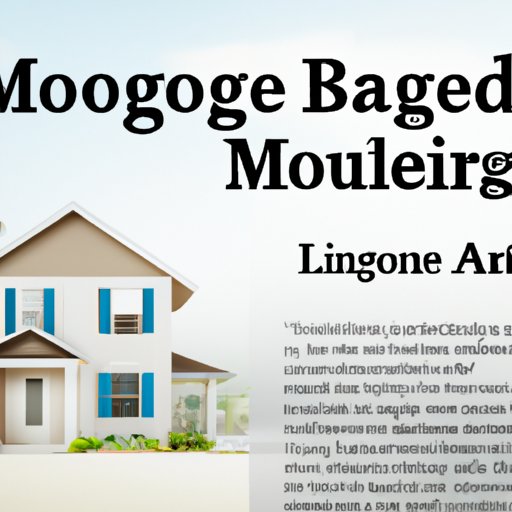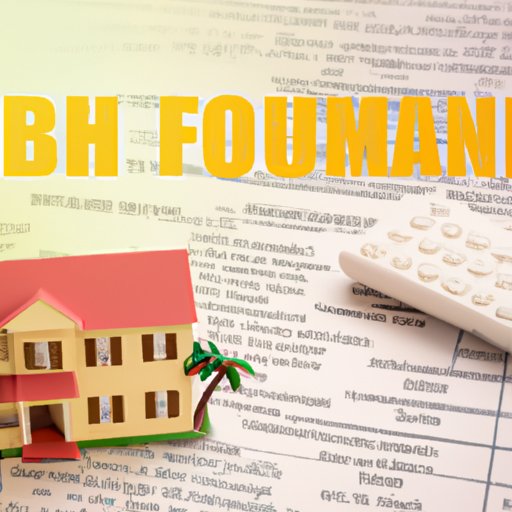Introduction
Buying a home is one of the most important and exciting decisions of your life. It’s also one of the largest investments you’ll make, so it’s important to understand exactly how much house you can afford. That’s why it’s essential to know the ins and outs of your finances, as well as the different mortgage programs available in your state – especially if you’re looking to buy a home in Florida.
The purpose of this article is to explore the process of determining how much house you can afford in Florida. We’ll look at how to calculate your maximum home price based on your income, as well as financial resources to help you understand what you can reasonably afford. We’ll also cover tips for budgeting and saving to buy a home in the Sunshine State, and investigate the impact of property taxes and insurance costs on affordability.
Calculating Your Maximum Home Price Based on Your Income in Florida
Before you start looking for a new home, it’s important to have a good understanding of your current financial situation. This includes knowing your monthly income and expenses, as well as any debt payments you’re making. Once you have a clear picture of your finances, you can begin to calculate how much you can afford.
One of the simplest methods for determining how much house you can afford is the 28/36 rule. According to the rule, you should spend no more than 28% of your gross monthly income on housing expenses such as mortgage payments, insurance, and property taxes. Additionally, your total debt payments should not exceed 36% of your gross monthly income.
For example, let’s say your gross monthly income is $5,000. Using the 28/36 rule, you would be able to spend up to $1,400 on housing expenses per month (28% x 5,000 = 1,400). Your total debt payments, including housing expenses, should not exceed $1,800 per month (36% x 5,000 = 1,800). By following this rule, you’ll be able to afford a home that fits within your budget.
Exploring Financial Resources to Help You Determine How Much House You Can Afford in Florida
Once you’ve calculated your maximum home price based on your income, there are a few other financial resources available to help you determine how much house you can afford in Florida. Consulting with a financial professional is a great way to get personalized advice on your specific situation. A financial advisor can review your finances, explain the different mortgage programs available to you, and provide guidance on budgeting and savings strategies.
In addition to consulting with a financial professional, there are many online tools and calculators available to help you estimate your maximum home price. These tools can give you an idea of what you can afford, but it’s important to remember that they don’t take into account all of the factors that go into buying a home. For the most accurate assessment of your financial situation, it’s best to consult with a financial professional.
Tips for Budgeting and Saving to Buy a Home in Florida
Once you’ve determined how much house you can afford in Florida, it’s time to start budgeting and saving. Establishing a budget is key to staying on track and keeping your spending in check. Make sure you include all of your fixed expenses, as well as any additional costs you may incur when buying a home, such as closing costs or moving expenses.
It’s also important to set aside money for a down payment. Most lenders require a down payment of at least 20% to qualify for a mortgage loan. The more you’re able to put down, the lower your monthly payments will be. Additionally, you may want to look into tax benefits available to first-time homebuyers, such as the Mortgage Credit Certificate program.

Understanding Mortgage Programs Available in Florida and What They Mean for Homebuyers
There are several mortgage programs available in Florida that can help make home ownership more affordable. FHA loans are government-backed loans designed for low-income borrowers who may not have the traditional credit or down payment requirements to qualify for a conventional loan. VA loans are available to veterans and active-duty military personnel and offer some of the lowest interest rates available. USDA loans are available to people living in rural areas and offer zero-down payment options.
Conventional loans are available to people with good credit and the ability to make a down payment. These loans typically require higher credit scores and down payments than FHA, VA, and USDA loans, but they offer more flexibility. Conventional loans are also less expensive in the long run since they don’t require mortgage insurance.

Investigating the Impact of Property Taxes and Insurance Costs on Affordability in Florida
When calculating how much house you can afford in Florida, it’s important to consider the impact of property taxes and insurance costs. Property taxes in Florida are generally lower than other states, with an average effective tax rate of 0.98%. However, the amount of property taxes you’ll pay can vary depending on the county you live in.
Homeowner’s insurance is also a significant cost to consider. In Florida, the average homeowner pays $2,084 annually for homeowner’s insurance. To estimate the cost of homeowner’s insurance in your area, you can use an online calculator or contact an insurance agent.

Examining Different Types of Loans That May Help You Afford a Home in Florida
Adjustable rate mortgages (ARMs) are a type of loan that offers a lower initial interest rate, but the rate can adjust over time. Balloon mortgages are a type of loan that requires the borrower to pay a lump sum at the end of the loan term. Interest-only mortgages are another option, allowing borrowers to pay only the interest due each month.
These types of loans may help you afford a home in Florida, but they come with certain risks. ARMs and balloon mortgages can be risky because their interest rates can increase significantly over time. Interest-only mortgages can also be risky because you’re not building equity in your home. It’s important to understand the risks associated with these types of loans before making a decision.
Conclusion
Buying a home in Florida is an exciting and rewarding experience, but it’s important to understand how much house you can afford. By calculating your maximum home price based on your income and exploring financial resources, you can confidently move forward with the home buying process. Additionally, it’s important to understand the different mortgage programs available in Florida and investigate the impact of property taxes and insurance costs on affordability. With the right knowledge and resources, you can find the perfect home for you and your family.
(Note: Is this article not meeting your expectations? Do you have knowledge or insights to share? Unlock new opportunities and expand your reach by joining our authors team. Click Registration to join us and share your expertise with our readers.)
